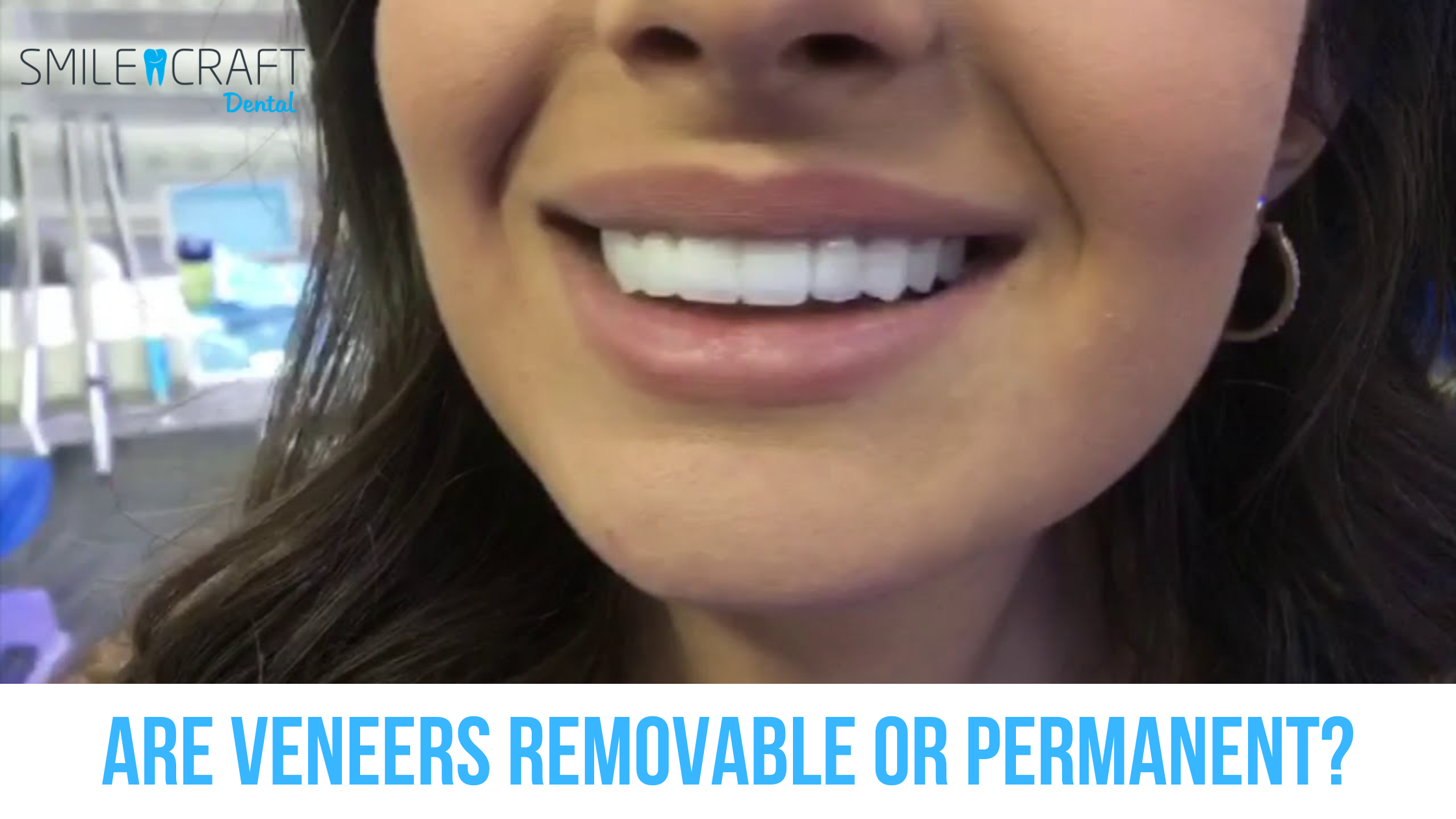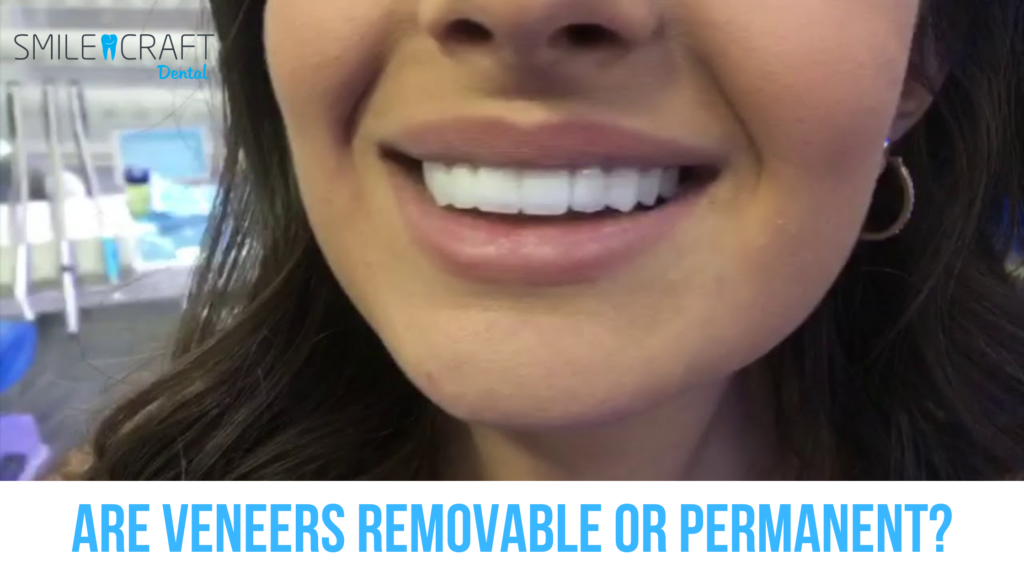 12 Apr 2022
12 Apr 2022 
If you’re considering veneers, you might be asking if the procedure is irreversible or if it can be reverted. So read on to learn more about cosmetic dentistry and make a better educated decision regarding your procedure.
First and foremost, the answer to the question that has been posted in the title itself is Yes. Veneers are a long-term solution. They’re made to stay on your body till the time you die. They typically last 10 to 20 years, and if one of your veneers loosens, breaks out, or erodes, it will need to be redone. You will never be able to undo the therapy.
This is because your existing enamel will need to be scraped down when you receive veneers, your dentist will need to do so. This procedure can’t be undone once it’s started. Even though this layer of enamel is extremely thin, it must be covered to safeguard the native tooth.
Your veneers will coat your teeth and create a strong link with them, ensuring that they remain strong and healthy. In certain circumstances, veneers might actually strengthen your teeth. Your remaining teeth would be weakened and more vulnerable to injury and disease if your veneers were replaced. As a result, veneers are seen as a long-term solution.
Prior to having veneers, it’s crucial to ensure that you are fully prepared, or else go for other options.
Veneers are an excellent technique to improve your smile, but since they are permanent, you must be certain that they are correct for you before proceeding. To achieve the finest results, you’ll need to take good care of your veneers and teeth consistently in the days ahead.
There are several additional therapies you may attempt if you don’t like the thought of a permanent, irreversible procedure. Teeth whitening is a non-invasive alternative for treating discoloured and stained teeth.
Teeth whitening, on the other hand, cannot alter your teeth. If that’s what you want, a procedure like dental bonding could be a wiser alternative. Dental bonding is the application of tooth-coloured dental resin directly to your tooth to restructure it and correct concerns such as spaces between teeth, malformed and misaligned teeth, and discolouration of teeth.
Are removable Veneers possible?
However, you might feel sceptical about permanent veneers and the enamel removing part might intimidate you. Then is the time when you wonder about the above question. The answer to that is Yes!
Removable Veneers
If you’re purchasing them online, you may take your own impressions and return them. When your snap-on veneers are prepared, the dentist will mail them back to you with a manual explaining the process of wearing them.
Snap-on veneers can hide a variety of dental flaws, including:
Removable veneers, often known as snap-on veneers, are a temporary alternative to permanent dental veneers. They’re a great option for folks who want a nice smile but are sceptical to go for permanent veneers. Snap-on veneers are a simple and painless procedure. Moulds of your teeth will be taken by a dental practitioner and sent to a dental lab.
- Teeth that are missing
- Teeth with gaps
- Discoloured teeth
- Stained teeth
Snap-on veneers, on the other hand, are unable to fix more serious issues such as misaligned teeth. This is due to the fact that they are not intended to affect the structure of your teeth. You should see an orthodontist if you have more serious issues that need to be addressed.
There are two types of removable veneers:
Prefabricated sets: These are made without taking into account your teeth or bite. Frequently the cheapest and least long-lasting alternative.
Custom-made: These are manufactured when a dental practitioner or at-home kit sends an imprint of your teeth to a laboratory. These are more costly but give a more tailored fit.
Temporary Veneers
Manufacturers used to make veneers in a variety of sizes, shapes, and colours when the veneering technique was new. From the numerous options, dental practitioners would pick the greatest match for their patients’ mouths and glue them to the teeth. This method is comparable to the one that is now utilised for temporary veneers. Even if skill and technology have evolved since then, the basic notion has not.
Temporary veneers are made of resin in pre-determined forms and sizes before being fitted by a dental practitioner. They then adhere them to your teeth, providing a temporary solution until a more permanent solution is available. Keep in mind that the bonding procedure prevents them from being removed without the help of a dentist.
How to use Snap-on veneers?
Snap-on veneers are similar to mouthguards. They fit over the top of your teeth. They may be easily removed without the assistance of a dental expert at any time.
Are they risk-free?
Snap-on veneers are generally considered safe for usage. The majority of manufacturing materials do not cause tooth decay or infection. However, if you do not wash your teeth on a regular basis, food particles can build up and cause dental problems.
Some of the components used may induce an allergic reaction, although this is uncommon. Because of the design of the snap-on veneers, some manufactured clip-on veneers may cause problems. Speak with a dental practitioner if you’re wondering whether snap-on veneers are the right ones for you.
Note- Snap-on veneers are considered to be quite safe. If you don’t clean them correctly, they might cause oral health problems. If you have caries, gum disease, or significantly misaligned teeth, veneers are not suggested.
However, there isn’t enough evidence to back up the secure and effective usage of removable veneers just now. Whether any of these seem interesting, make an appointment with your dentist to see if they’re a suitable fit for your oral health.
Snap-on veneers vs. traditional veneers
Traditional veneers are made up of a very fine coating of porcelain that is shaped, sized, and coloured to match the form, size, and colour of your teeth for a flawless smile. Traditional veneers that are made to seem like natural teeth can last anywhere from 10 to 20 years, depending on the materials used. Traditional veneers, on the other hand, can prove to be expensive. Snap-on veneers become a more practical alternative in this situation.
Snap-on veneers, unlike actual veneers, may be installed and removed at any time. They don’t require any dental implants, bonding, or gum or tooth tissue removal. Snap-on veneers are often constructed of resin and serve as a cover for your natural teeth. When the veneer is properly placed, it makes a snapping sound as it covers the teeth. Snap-on veneers are significantly less expensive than regular veneers.
How much do Veneers cost?
Veneers are available in a wide variety of styles and grade levels. As a result, the expenses might vary significantly. The ultimate cost is affected by where you reside, the dental practitioner you choose, and the type of veneers you choose.
There’s a basic guideline to remember: the more is the customisation, the more it will cost. Any option that needs little to no customising will undoubtedly be less expensive than those that require expert personnel to create and fix the veneer to your teeth.
Removable veneers are typically the most affordable choice since they need the least amount of modification. Depending on the number of teeth covered and whether you’re getting custom-made, prices might vary significantly. Even though the removable ones are generally the most cost-effective option, it is suggested to speak to your dentist before purchasing or using them.
Composite veneers, which can cost several hundred dollars per tooth, can be created by dental specialists. Custom porcelain laminate veneers are more costly, ranging from $925 to $2500 per tooth, and are made in laboratories.
Veneers: How to Take Care of Them
A simple idea is to treat your veneers the same way you would your natural teeth, just a bit more softly. Because veneers are not as strong as real teeth, you should avoid flossing too hard or doing anything that might destroy a natural tooth.
Tips for aftercare:
- Brush twice a day for 2 minutes and floss once a day.
- To keep them looking their best, use a whitening toothpaste.
- To keep your veneers in tip-top form, see your dentist or dental hygienist on a regular basis.
Things to stay away from:
- Using your teeth to chew ice, bite your nails, or open bottles
- Tobacco, coffee, and other chemicals that can discolour your teeth
Wrapping up
When choosing veneers it’s crucial to keep in mind that each variety has its own set of advantages. It’s perfectly fine if what works for one patient doesn’t work for you. If you’re thinking about getting detachable veneers, make sure you talk to a dentist beforehand.
As a result, it has previously been said that removable veneers are cost-effective, but they may not last as long or deliver flawless results. Permanent veneers are composite or porcelain veneers that stay in your mouth for years and cost a lot of money. After reading this, you can be assured that you have all of the facts you need to make an educated decision.
